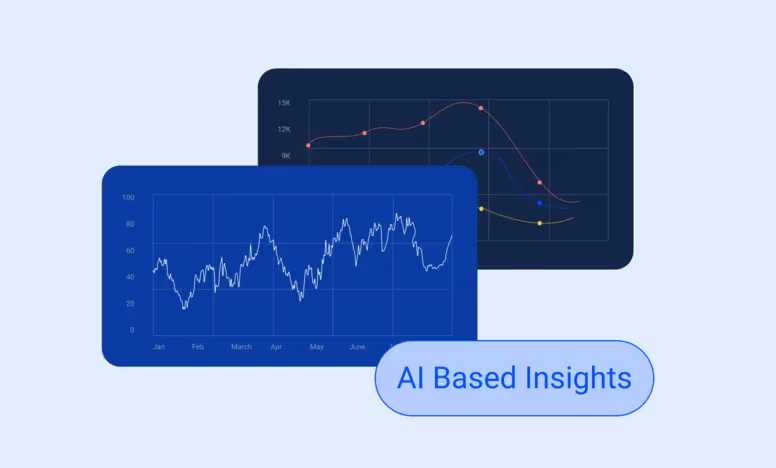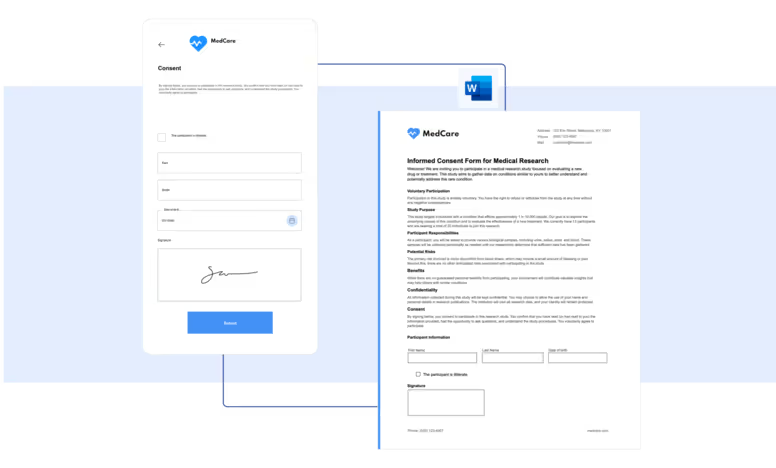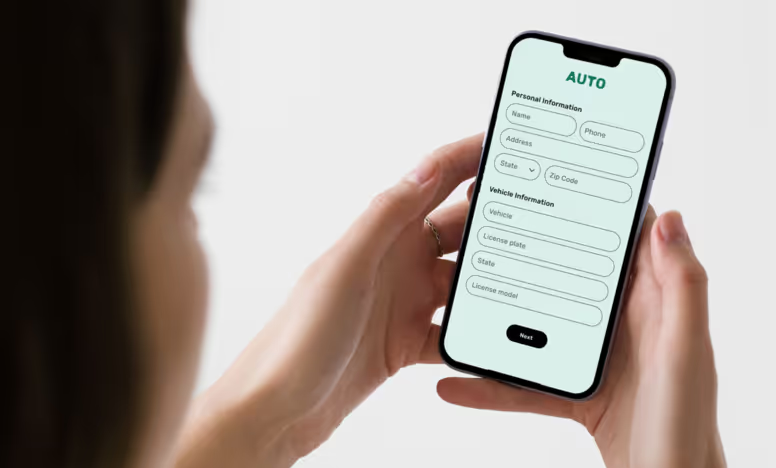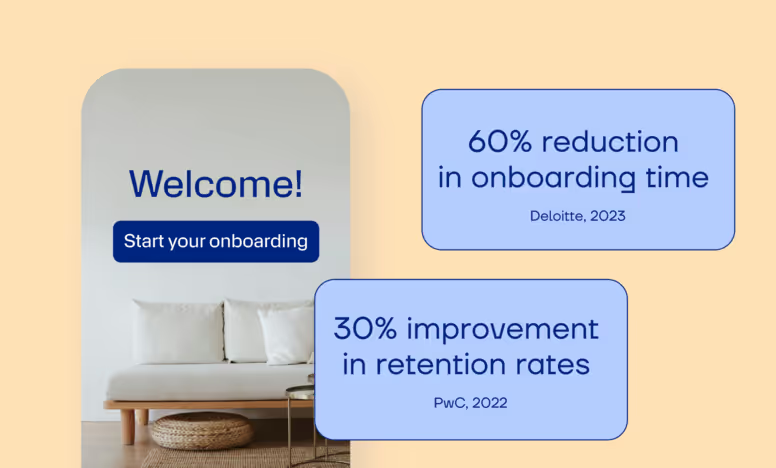Intro
Salesforce has redefined customer relationship management (CRM) across industries, providing healthcare organizations with a powerful platform to manage interactions, streamline processes, and enhance patient experiences. However, the true potential of Salesforce lies in leveraging its capabilities with innovative tools that address the unique challenges of healthcare. This eBook highlights seven impactful use cases, showcasing how healthcare providers can enhance efficiency, ensure compliance, and deliver exceptional care.
Ch. 1: Leverage AI for smarter decisions
Use case: Transforming patient data into actionable insights with AI-driven analytics.
Why it matters: Healthcare organizations manage vast amounts of data, from patient records to operational metrics. AI-powered analytics provide actionable insights, enabling providers to predict patient needs, optimize resources, and enhance care quality. Predictive modeling helps prevent issues before they arise, driving proactive decision-making and better outcomes.
Key benefits:
- 35% improvement in operational efficiency (McKinsey, 2022).
- 20% reduction in resource allocation costs (Gartner, 2023).
Examples of impact:
- Private practices: Using predictive analytics to anticipate patient no-shows and optimize appointment scheduling.
- Assisted living facilities: Identifying residents at risk of hospitalization through early warning systems.
- Fertility clinics: Personalizing treatment plans by analyzing patient data trends and predicting outcomes.

Ch. 2: Empower customers with digital self-service
Use case: Implementing client self-service portals to enhance user experience and reduce administrative workloads.
Why it matters: Patients expect autonomy in managing their healthcare interactions. Self-service capabilities provide instant access to appointment scheduling, medical records, and resources. Salesforce-integrated portals empower patients to take charge of their care while reducing the workload on administrative teams, allowing staff to focus on delivering exceptional support.
Key benefits:
- 25% reduction in administrative costs (Forrester, 2022).
- 30% increase in patient satisfaction (Salesforce State of Service Report, 2023).
Examples of impact:
- Fertility clinics: Allowing patients to book consultations, access lab results, and review treatment plans through a secure portal.
- Assisted living facilities: Enabling families to monitor resident care plans and communicate with staff seamlessly.
- Private practices: Providing instant access to health records and billing information, enhancing patient trust and engagement.

Ch. 3: Streamline document management
Use case: Automating the generation of personalized and compliant documents with dynamic templates.
Why it matters: Dynamic document generation simplifies the preparation of critical healthcare documents, such as eConsent forms and treatment plans. Automation reduces errors, saves time, and ensures compliance with regulations. In healthcare settings, streamlined document workflows enable providers to focus on patient care rather than administrative tasks.
Key benefits:
- 70% reduction in document preparation time (Forrester, 2022).
- Significant decrease in human errors (IDC, 2023).
Examples of impact:
- Fertility clinics: Digitizing eConsent forms for treatments, improving understanding and reducing delays.
- Private practices: Automating the creation of personalized care plans and medical summaries.
- Assisted living facilities: Streamlining the generation of admission agreements and care assessments.

Ch. 4: Centralize customer interactions
Use case: Delivering seamless omnichannel patient engagement.
Why it matters: Fragmented communication can undermine trust and satisfaction. Patients expect consistent interactions across email, phone, and online portals. Salesforce, integrated with advanced digital tools, centralizes these touchpoints, creating a unified experience. This reduces response times, empowers staff with a comprehensive view of patient history, and strengthens relationships.
Key benefits:
- 20% increase in patient engagement (Aberdeen Group, 2023).
- 25% faster response to patient inquiries (Gartner, 2023).
Examples of impact:
- Fertility clinics: Managing patient queries across email, phone, and chat for a cohesive support experience.
- Healthcare providers: Streamlining post-discharge communication for continuity of care.
- Assisted living facilities: Coordinating family updates across multiple communication channels.

Ch. 5: Simplify agreement signing
Use case: Automating approvals and document signing with eSignature tools.
Why it matters: Delays in signing critical healthcare agreements, such as consent forms or billing contracts, can disrupt operations and patient care. Salesforce-enhanced eSignature tools ensure secure and efficient execution of documents, enabling timely approvals and fostering trust. Automation reduces manual paperwork, saving time and resources while improving compliance.
Key benefits:
- 80% faster agreement turnaround times (P&S Intelligence, 2021).
- Enhanced compliance and audit trails (Salesforce Compliance Report, 2023).
Examples of impact:
- Fertility clinics: Accelerating the signing of consent forms for procedures.
- Private practices: Finalizing treatment plans and financial agreements seamlessly.
- Assisted living facilities: Simplifying the approval of care plans and resident agreements.
Ch. 6: Streamline onboarding processes
Use case: Providing seamless onboarding experiences for patients and staff.
Why it matters: A smooth onboarding process sets the tone for long-term relationships. Salesforce-powered workflows automate onboarding steps, ensuring consistency and reducing errors. Personalized journeys help patients feel valued and supported, while streamlined processes save time for staff and administrators.
Key benefits:
- 60% reduction in onboarding time (Deloitte, 2023).
- 30% improvement in retention rates (PwC, 2022).
Examples of impact:
- Assisted Living facilities: Automating resident onboarding, including medical assessments and agreement signing.
- Fertility clinics: Guiding patients through treatment onboarding with tailored resources.
- Private practices: Streamlining new patient registration and medical history collection.

Ch. 7: Ensure compliance and security
Use case: Automating compliance processes and securing sensitive patient data.
Why it matters: Compliance with healthcare regulations like HIPAA is essential to protect patient trust and data integrity. Manual processes are resource-intensive and prone to errors. Salesforce’s automated compliance tools ensure adherence to standards, enable audit readiness, and safeguard sensitive information. This builds confidence among patients and providers.
Key benefits:
- 40% reduction in compliance-related issues (IBM, 2023).
- Improved audit readiness and robust data protection (Gartner, 2023).
Examples of impact:
- Healthcare providers: Maintaining HIPAA compliance while securely managing patient records.
- Fertility clinics: Ensuring regulatory compliance during sensitive data handling.
- Assisted living facilities: Safeguarding resident health data with automated security protocols.
Conclusion: Unlock Salesforce's Full Potential
Enhancing Salesforce with the right tools is essential for healthcare providers striving to maintain a competitive edge. By leveraging these seven use cases, organizations can streamline operations, improve patient satisfaction, and achieve excellence in care delivery. These solutions not only drive immediate benefits but also lay a strong foundation for long-term success in the dynamic healthcare landscape.
Meet EasySend
EasySend is a digital platform offering innovative solutions, including eSignatures, Dynamic Documents, and customer-facing digital processes, designed to complement Salesforce. With EasySend, healthcare organizations can simplify interactions, accelerate operations, and enhance the patient experience.



.avif)
.avif)


.avif)
